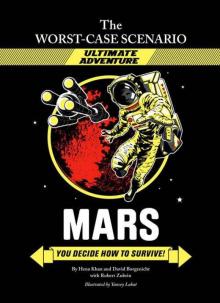- Home
- David Borgenicht
Ultimate Adventure Novel: Mars
Ultimate Adventure Novel: Mars Read online
The
WORST-CASE SCENARIO
ULTIMATE ADVENTURE
MARS
YOU DECIDE HOW TO SURVIVE!
By
Hena Khan and David Borgenicht
with Robert Zubrin, Mars consultant
Illustrated by Yancey Labat
Table of Contents
WELCOME TO YOUR MARS ADVENTURE
MARS Expedition File
MARS base 1
MARS: An explorer’s guide
MARTIAN Robots and Transporters
How to Handle a Fire on a Spacecraft
How to Navigate at Night on Mars
How to Survive a Martian Dust Storm
About the Contributors
Copyright
YOU are a member of the Young Astronaut program, handpicked to join a talented international crew on an incredible journey to Mars. Your mission is to:
Arrive on Mars after a six-month ride on the Fire Star spacecraft.
Help prepare Mars Base I for its first wave of permanent settlers—and make sure you don’t cause any setbacks during your year and a half on the Red Planet.
Get back to Earth after another six-month ride.
At certain points during your adventure, you’ll be asked to make choices that will change your story. There are twenty-four possible endings to your mission, but only ONE PATH through the book will fully accomplish your goals.
Before starting your mission, make sure to read the Expedition File at the back of the book. It’s filled with important information you’ll need to make wise choices.
You won’t be alone on your mission—your fellow astronauts will offer advice and encouragement along the way. But ultimately YOU control your choices and your destiny. So, trust in your good judgment, use the resources you have, and you’ll make it to Mars—and back—like a star!
YOUR CREW
NICOLAS MOREAU
AGE: 14
HOME COUNTRY: FRANCE
Although he goes by Nico for short, this French astronaut isn’t short on anything, especially personality. A mechanical whiz, Nico dazzles everyone with his charm and his ability to take machines apart and put them back together. But sometimes Nico can get a little overconfident and carried away with his ideas.
ANEESA MALIK
AGE: 15
HOME COUNTRY: INDIA
Aneesa has never met a circuit she didn’t like. The youngest person ever to complete an electrical engineering degree in India, she went on to join the country’s space program, where she is a rising star. Aneesa is good at whatever she sets out to do, but she hasn’t had to deal with failure much, so her morale could sink if she faces a setback on the ship.
WEN XIANG
AGE: 40
HOME COUNTRY: CHINA
Wen is the commander of the mission. He has a no-nonsense personality, does everything by the book, and demands perfection from his crew. Wen isn’t sure how many more missions he will be able to lead before he retires, and he’s determined that this one will succeed.
COOPER JACKSON
AGE: 33 HOME COUNTRY: U.S.A.
A born daredevil, Cooper joined the space program to fulfill his sense of adventure. Cooper loves surfing, rock climbing, and skydiving, and he’s known for taking big risks to get maximum excitement—even if it means getting hurt sometimes. But as the flight surgeon, which is what crew doctors are officially called, he never takes chances with anyone else’s health. It’s possible, though, that his love of action will make six long months on board a spacecraft very challenging for him.
JULIE DAVIS
AGE: 29 HOME COUNTRY: U.S.A.
A passionate biologist, Julie grew up on a farm in rural Iowa and is happiest around animals. Her shyness disappears if you get her talking about them—then she can go on for hours. Julie is convinced there is life on Mars, and that she will be the one to find it.
VICTORIA ORLOVA
AGE: 38 HOME COUNTRY: RUSSIA
Victoria is a professor of astrophysics at a prestigious university, and really knows her stuff. After years in the space program, she is an expert on many things, and she knows it. Victoria can be your greatest ally, but she doesn’t have patience for anything less than your best work.
“Fire Star, you’re go for launch,” says Mission Control.
Your hands sweat as you grip your armrests a little tighter. You’re strapped into your seat, leaning completely backward with your legs toward the ceiling. In just one minute, five giant rockets will roar to life underneath you and catapult you into space.
You feel your heart pounding inside your launch suit. You’ve been training for months for this mission, sitting on simulators, practicing space walks underwater, and studying every system of the spacecraft you’re in. You’ve dreamed of this moment your whole life. And now it’s about to happen, sooner than you ever imagined: You are heading to MARS!
“Roger, launch center,” says Commander Wen.
“T minus one minute and counting,” says Mission Control.
You turn to give thumbs-up to Nico and Aneesa, the other junior astronauts on the crew. The three of you were chosen from thousands of applicants all over the world to be part of this historic mission: to prepare Mars Base I for the first wave of permanent colonists. The goal of the Mars Program is for people of all ages to live on the Red Planet someday, and your mission will prove that young astronauts cannot only make the journey to Mars, but that they can handle important jobs on the base too. There were a lot of skeptics, those who thought that young people had no business in space, let alone on Mars. And you know what? You are so ready to prove them wrong!
“Fire Star, close and lock your visors, and have a good flight,” says Mission Control as the rocket boosters fire up. You close and lock your visor and take a deep breath.
“T minus ten…nine…eight…“
You imagine the crowds watching outside, waving flags from the five countries involved in the mission, plus all of the people watching on television screens around the world, and you feel a rush of emotion and pride. You will be successful on this mission—whatever it takes!
“…seven…six…fIve…”
This is it! You are about to leave planet Earth!
“…four…th ree…two…one…”
You’re thrilled that you get to share this experience with Nico and Aneesa. After six months of training together, the three of you have become great friends.
Soon, you witness what every astronaut dreams about—the view of Earth from space. It’s amazingly beautiful, more than you even imagined, with its bright blue oceans and lush green forests. You can’t believe that you won’t be back to your home planet for two and a half years. It’ll take six months to get to Mars, a year and a half to complete your mission, and another six months to get home. But you’re filled with excitement about the adventures waiting for you!
Now it’s sixty days after launch. You wake up and unstrap yourself from your sleeping bag, which is attached to the wall of the spacecraft. Even after two months in flight to Mars, it still makes you smile to see your fellow astronauts slumbering with their arms floating in front of them, like zombies. But that’s what happens in microgravity—if something is not strapped down, it floats.
You’ve gotten pretty accustomed to using Velcro strips to keep things in place, including yourself. And now you can glide through the cabin like a pro, without bumping into walls or your crewmates.
“Good morning!” says Victoria, the astronaut whose family picked today’s wake-up song, a pop tune from Russia, her home country. The music is broadcast from Mission Control over the intercom, which is known as “com” for short.
Victoria is a smart profess
or of astrophysics who always keeps you on your toes. She hums along to the music as the two of you head over to the kitchen area, where you find Cooper fixing himself breakfast. Cooper, an American who grew up in California, is a daredevil who is most comfortable on top of a wave, dangling from a cliff, or jumping out of a plane. He loves the physical thrill of being an astronaut, and he’s famous for completing the longest space walk in history.
“Eggs over easy, with home fries, please,” you joke.
“Nothing I do is easy!” Cooper replies. “Try my protein shake—a few sips of this and you’ll be powered up for hours. You might even get through your workout today!”
He shakes his cup and a few drops of chocolate banana smoothie come floating toward you. You expertly catch them in your mouth—yum!
As the crew doctor, it’s part of Cooper’s job to make sure that everyone completes their daily physical fitness routine, which includes activities like “running” while strapped to a treadmill, biking on a stationary machine, and using stretchy bands to keep your muscles in shape. The workouts are required, since your muscles don’t do much while you’re floating around in microgravity and will become weak if you don’t exercise them. Cooper acts like a personal trainer sometimes, pushing you to pedal faster or stretch for longer than you would otherwise.
“Isn’t it too early to be talking about workouts?” asks Julie as she floats toward you, rubbing her eyes. Julie is another American crew member, but she’s the opposite of Cooper. A biologist and animal lover, her idea of a thrill is watching chicks hatch or milking a cow.
“Never!” responds Cooper with a playful jab. “And if you’re lucky, I’ll tell you all about the latest findings of my muscle-density project.”
Cooper does a lot of side projects in addition to his assigned work on the ship. He likes to keep himself busy, as you’ve noticed. For his muscle-density project, he’s comparing how different types of exercise affect how muscles respond to being in space. You’ve volunteered your own muscles as “data”—an offer you sometimes regret, because it means that
Cooper really cares about your exercise regimen.
You decide to drink one of Cooper’s smoothies and see if it really does help you get through your late-morning workout. He’s developed a new routine for you and Julie, and he has you both strap your feet to the floor of the compartment to hold yourselves in place. Then, as you bend your legs and turn at the waist, you pull a weighted band back and forth. It seems easy enough at first, until your legs start to burn!
“Faster!” Cooper encourages. “You still have three minutes to go! And then we’re gonna hit the bike!”
You spend the next hour biking, sweating, running on the treadmill, and sweating some more. Finally, the workout is over. Cooper gives you a thump on the back.
“Good job, superstar! You hung in there, and you earned your shower.”
You’ve never been more grateful that the Fire Star is equipped with a real shower, although everyone is limited to showering for two minutes every two days because of the limited water supply. You can’t imagine what life used to be like on board the International Space Station years ago, when astronauts had no showers at all and had to stay clean using only dry shampoo and baby wipes.
After a quick but refreshing shower, you spend the rest of the afternoon upgrading a computer system, which is your assignment for the day. Cooper is in the command module with you, and he’s designing new workouts, checking medical records, and working on his muscle-density project. You wonder when he’s going to get to his assignment for the day—he’s supposed to monitor the ship’s ventilation system, which includes replacing filters that remove dirt, dust, and bacteria from your breathing air, and any defective fans, which keep the air circulating.
“Five minutes to our evening briefing,” says Commander Wen over com.
During the evening briefings, everyone runs through their tasks and gives updates on their progress. Every person on the crew has to help with checking, cleaning, and maintaining all of the systems on board. It’s not the most glamorous work, and it gets boring sometimes to repeat the same things over and over, but it’s essential. Any small malfunction could mean serious problems for the spacecraft and the crew.
You hurry to the meeting. Commander Wen runs a tight ship, and you never want to be late. You’re not as intimidated by the highest-ranking astronaut, from China, as you were when you first met him. Now that you’ve gotten to know him, you think he’s really kind and fair. But you still work hard to impress him.
“What’s the bacon shakin’?” asks Nico as you take your place next to him. Nico is French, and you laugh at his mix-up of the American expression you taught him.
“You mean, ‘what’s shakin’, bacon?’” you say, but then he winks and you realize that he’s just kidding.
That’s Nico—always making everyone laugh, even if it means making fun of himself, and definitely if it means making fun of others! But he’s so good-natured about it, no one ever minds. He is also a mechanical mastermind, and can be found tinkering with a robot or a spare part during any free time.
You and Aneesa exchange smiles. Aneesa is a bit more serious, but supersmart, and one of the best problem solvers you’ve ever met.
“Let’s get started,” Commander Wen says, looking down at the list of jobs on his clipboard. “How’s the ventilation system, Cooper?” he asks.
Cooper looks up, startled to be called on first.
“Um, yeah…it’s fine,” he mumbles. You steal a glance at Cooper, who doesn’t look at you. The two of you spent most of the day together, and you never saw him monitoring anything. You wonder when he could have done his job, and if he made all the filter and fan replacements that were needed.
“How’s the computer system update going?” Commander Wen asks you next, interrupting your thoughts.
“Complete,” you report back.
Commander Wen nods in approval and continues making his way down the list of jobs. The meeting wraps up with everyone rushing off to finish their work before dinner.
“Hey, Cooper, do you need a hand with the ventilation system?” you offer as you head out.
“Uh, that’s okay, superstar. It’s no big deal,” Cooper responds.
But you don’t see him anywhere near the monitoring station the rest of the day.
Later that night, you can’t get this nagging thought out of your head: When Cooper said the monitoring was “no big deal,” did he mean that he didn’t think it was important? Could he have skipped it? You admit to yourself, it is tempting to skip your routine jobs sometimes, especially when the work gets tedious, but it still has to get done.
You look over at Cooper, who is busily recording updates about the crew’s health. You know he works hard, but it seems like he always focuses on the work that he likes—the workouts, his side projects, medical stuff. If he is skipping the ventilation monitoring, it’s serious—he could be putting the whole crew at risk. On a spacecraft, you can’t just open up a window to get some fresh air—you need the ventilation system to be in perfect working order so you all can breathe.
You’re not sure what to do. You could just ask Cooper again if he did the monitoring. But as a junior crew member, you don’t know how he’ll react. He’s been on several missions before, so he has experience on his side. Plus, he outranks you, so he might not appreciate being nagged.
Going straight to Commander Wen is out of the question. He’s so busy, he’d never want you to bother him with something you hadn’t tried to handle on your own first. Part of you thinks it might be easier to just check Cooper’s work log and see if he recorded anything. If he hasn’t, you can keep offering to “help” him until he gets it done. If he really won’t do anything, then you can go to Commander Wen. The risk is that if Cooper finds out you peeked in his log, he might get angry at you for snooping. But that’s only if he catches you. The log is easy to access right over there at the command module, and Cooper seems like he’ll be wor
king elsewhere for a while. What do you choose?
CONFRONT COOPER DIRECTLY ABOUT HIS WORK.
TAKE A PEEK AT HIS LOG WHEN HE ISN’T LOOKING.
“Okay, let’s do it!” you tell Nico. You follow the blueprint designs that he comes up with and, with his help, make the changes to the telerobots. This includes adding new front wheels, which allow for 360-degree rotation, using bigger tires, adjusting the gearing, and installing an extra battery pack for more power. Meanwhile, Nico works on the body of the robots, making them a lot lighter and sleeker and more like race cars.
“They look so cool!” you say when you’re done.
“Well, let’s see what they can do,” Nico says.
You create a course for the robots to race, and line them up at the start line.
“Winner gets to take the rest of the day off, and the loser has to do both of our assignments,” Nico adds.
You put your finger on the accelerator button, waiting for the clock to tick down. Three…two…one…go!
Nico’s robot takes a quick lead, but yours starts to catch up after a few seconds. They are soon neck and neck and about to turn the next corner when, suddenly, you lose control of your robot. It swipes Nico’s robot, causing them both to go off course and straight into a wall at high speed.

 Extreme Junior Edition
Extreme Junior Edition Middle School
Middle School The Worst-Case Scenario Survival Handbook: Middle School
The Worst-Case Scenario Survival Handbook: Middle School Junior Edition Bundle
Junior Edition Bundle The Worst-Case Scenario Ultimate Adventure Novel: Deadly Seas
The Worst-Case Scenario Ultimate Adventure Novel: Deadly Seas Holidays
Holidays Ultimate Adventure Novel: Mars
Ultimate Adventure Novel: Mars Ultimate Worst-Case Scenario Survival Handbook
Ultimate Worst-Case Scenario Survival Handbook